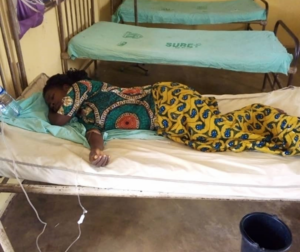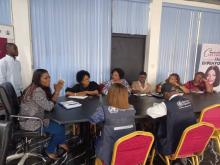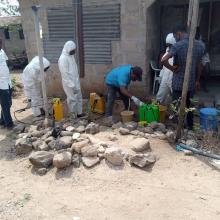WHO supports Cross River State to combat cholera outbreak
Calabar, 4 April, 2023 - Cholera is endemic in Nigeria. It is highly contagious and occurs in places without safe water and proper sanitation. It causes profuse diarrhoea and vomiting, and without treatment can quickly lead to severe dehydration followed by death .
At about 6:40 pm on 17 January 2023, Gift Sunday-James, (35 years) shouts for help as she approaches the Primary Health Centre (PHC) located in Ovomum, Obabura Local Government Area (LGA), in Cross River State.
Her brother Emmanuel Sunday-James, conveyed in a taxi, had been stooling and vomiting continuously and was now dehydrated and could not move.
“As a farmer, my usual practice was to drink water from the stream near my farm” says Mr Emmanuel.
On that fateful day Mr Emmanuel fell ill, he recalled drinking water from the stream.
“I was passing watery stool and vomiting for about four hours after getting home. I felt like I was dying, and I am grateful for the quick intervention I got at the health facility, he says.
At the clinic, Mr Emmanuel was placed on Intravenous Fluid (IVU) and subsequently on oral rehydration solution.
Furthermore, a Rapid Diagnostic Test (RDT) was conducted on his stool sample and it tested positive for cholera.
Mr Emmanuel has since been discharged and now advises people to drink purified water either by boiling or using water purifiers.
“I don’t want anybody to experience what I went through,” he says.
Interrupting the outbreak transmission
Aside from Mr Emmanuel. many people have reported cases of stooling and vomiting in other LGAs (Abi, Biase and Obabura, and Ikom,Etung). While some got better after being hospitalized, some died from the disease particularly those who reported late for treament.
An epidemiological report from the State Ministry of Health shows that 638 suspected cases and 17 deaths have been reported between December 2022 and February 2023 in the affected LGAs.
To stop further fatalities, the state government, in collaboration with the World Health Organization (WHO) and its partners, set up a Rapid Response Team (RRT) comprising experts to coordinate the interruption of the disease,” says Dr Janet Ekpeyong, the Cross River State Commissioner of Health.
“With support from partners, we increased the capacity of existing cholera treatment centres (CTC) in the hotspot LGAs. The government is committed to taking action to ensure residents of the state have access to safe drinking water and sanitation services to reduce the incidences of cholera and other waterborne infectious diseases.
Commending WHO for its prompt support, Dr Ekpeyong says “WHO is a dependable lead partner providing technical guidance, coordination and also donated medical commodities for the emergency cholera intervention in the state.
Part of WHO’s support to the state included the donation of Rapid Diagnosis Test (RDT) cholera kits, and Cary Blair medium for transporting stool samples for culture testing for effective diagnosis of the patients.
In addition, 2000 intravenous fluids, cannula and oral rehydration salts and Infection Prevention Control (IPC) commodities were donated.
“The donated medical commodities eased testing and case management, says the WHO State Coordinator in Cross River State, Dr Yewande Olatunde.
Dr Olatunde explains that WHO further supported the replenishment of testing and treatment commodities at the 29 cholera treatment units (CTU) in three hotspot LGAs.
“To enusure all cases receive prompt care at the facilities, WHO conducted an extensive training for health professionals on treatment, and increasing infection prevention and control (IPC) measures,” she adds.
Robust community engagement
Further working with community leaders and volunteers from the affected communities, WHO partnered with the state to promote educational risk messaging on water, sanitation and hygiene (WASH) and conducted decontamination of homes of active and recovered persons, health facilities attending to cases and providing IPC materials to volunteering community members.
The WHO-trained volunteers from the affected communities conducted house-to-house (H2H) awareness campaigns to stop the spread of the disease.
From December to January, 4811 households were covered, and 88 607 residents were educated about WASH and IPC control measures in the three hotspot LGAs of the state.
Base on the integrated support and coordinated response, there has been a decline in the number of cases reported since January. ( 69% decline between Epi-weeks 3 and 7, 2023).
Other partners involved in the response are Nigeria Centre for Disease Control and Prevention (NCDC), UNICEF, Medicine San Frontier (MSF) and Save the Children, who donated commodities to strengthen the Cholera response.
Technical Contact:
Dr Olatunde Yewande Rebecca; Email: olatunder [at] who.int (olatunder[at]who[dot]int)


